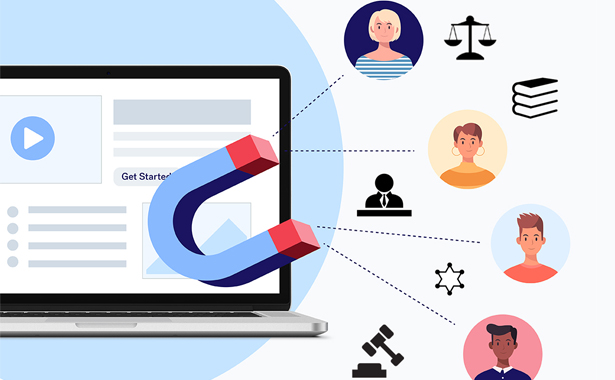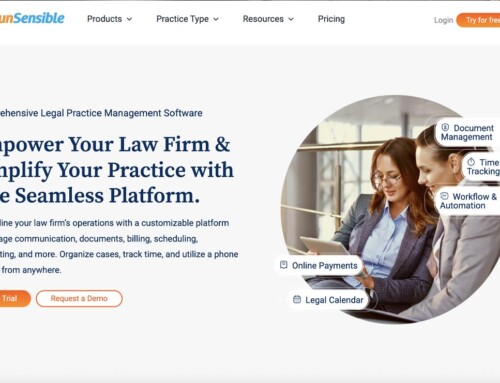Contents
When you’re in business, it’s tempting to think that your customers are always right. After all, they pay your bills and make your business a success! But with great power comes great responsibility, and that includes making sure you’re giving them what they need when they come to you for help. If a customer goes away without having their needs met or with unanswered questions still clouding their mind, then it’s going to be harder for them to trust you again. That’s why it’s so important to have some lead magnets ready on hand at all times—items that can be given away for free but do an amazing job of building relationships with new clients while also educating them about your legal expertise.
In this post we’ll show you how easy it is create these kinds of materials by offering 10 examples from top lawyers across the country who are doing just that! We’ve got everything from blog posts and videos about common legal questions like estate planning and wills down through more niche topics like landlord tenant law – so scroll down now!
The law is a competitive field and as a result, it can be difficult to attract customers. However, if you are looking for a way to generate leads for your firm without spending money on expensive marketing campaigns or large advertising budgets, then this article will help. In this blog post, we will discuss 10 lead generation ideas that lawyers can implement. First, however, we’ll go over some basic lead generation ideas.
Tips and Tricks for Increasing Your Leads without Paying for Ads
Content marketing
Content marketing is one of the best ways to generate leads. It can be used to build your brand, improve search engine rankings and drive traffic to your website or blog.
The first step in implementing content marketing is writing high quality articles that will attract your target audience. You can then use various online tools such as BuzzSumo, which allows you to search for popular content around any topic and find out which sites are sharing it; or SEMRush, which helps you track how well each article performed on social media channels like Facebook, Twitter and Pinterest (the latter has been known to drive lots of referral traffic).
Create a professional website
Another great way to attract clients is through your website. This does not have to be an expensive endeavor, as there are plenty of free platforms that allow you to create a professional-looking site without putting out a lot of cash up front. A good place to start is Squarespace or Wix, which both offer easy-to-use templates and support in creating professional websites in no time at all.
If you have the budget for a custom design and development team, there are options available for this too! However if not, these two sites make it easy for anyone who knows how to use WordPress (or other CMS platforms) but might not know where else to begin their search for help with setting up their new website.
When choosing your domain name consider keywords relevant for your business/service area; something short and memorable such as “LawyerMarketingCoach” would work well here versus something longer like “LawyerMarketingCoachLLC.” Make sure whatever URL’s you choose don’t infringe upon any other trademarks or copyrights – do some research beforehand so that nothing comes back later down the road when people try searching those terms online.”
Create video content
When it comes to lead generation, video content is a great way to reach a wider audience. Videos are more engaging than text and can be used for marketing, training and education purposes. They provide your potential clients with an opportunity to get to know you better through the use of storytelling. When they see how knowledgeable you are in your field and how dedicated you are to helping people solve their problems by providing them with a solution tailored specifically for them, they’re likely going to want what you’re offering!
You can also use videos as part of your client retention strategy. By sharing testimonials from previous clients or even those who have hired other lawyers in your area they will be able to see what happens when someone hires one of the many inexperienced lawyers out there (and why it would be best if that person hires someone who actually knows what they’re doing).
Conduct webinars
Webinars are a great way to generate leads and teach at the same time. Webinars allow your clients to learn more about their legal issues and get answers to questions they may have.
They also give you an opportunity to showcase your expertise in front of a live audience. It’s important that you prepare well for this type of event because it can help build trust with potential clients, leading them to become loyal clients who refer others to you as well. Here are some essential tips on how to make webinars work:
- Create an engaging topic that allows you to share valuable insights with attendees while giving them something they want (or need).
- Create a powerful presentation so people are compelled enough by what they see or hear from your webinar that they want what’s being offered by attending future events hosted by attorneys or firms just like yours!
Post valuable content regularly on your blog
Blogs are an excellent way to communicate your expertise to potential clients. They also allow you to showcase real cases and use them as examples of how you can help solve their problems.
Creating a blog that people will find interesting is not easy, but it’s worth it if you want more leads. You’ll need to make sure that your blog is well-designed and easy to navigate; visitors should be able to find what they’re looking for without having any trouble. It’s also important that the content on your site has a clear call-to-action (CTA) so that readers know exactly what action needs taking next (e.g., purchase my book).
Social media is another great way of promoting blogs if you have one already set up and ready for visitors from social media sites like Facebook or Twitter – just make sure there’s some kind of CTA on each page!
Create useful legal guides
You can create useful legal guides and make them available to download free of cost on your website. This will help you build a reputation as an expert in your field, and increase the chances of getting clients who need your services.
Include a contact form on your website so people can contact you easily and quickly. Also, ensure that it is easy for visitors to find this form on every page of your website. Not sure what to put in your guides or how to write them? Well, this next section is just about that, giving you 10 topics to get inspired by. Of course, you need to create a landing page to actually get the leads’ names and email addresses. With RunSensible’s expansive lead generation toolkit, you’ll get access to a landing page designer, branded live chat, lead qualification and tracking tools, and more.
10 Lead Magnet Subjects for Lawyers
“7 Warning Signs Your Contract’s Not Legally Binding”
A contract is not legally binding if it does not meet certain requirements. In the legal world, these are known as “voids,” and the failure to address them can lead to serious consequences for both parties involved in the contract.
One of these voids happens when only one party signs a contract because it requires two signatures to make it valid. For example, if an employer hires you without getting your signature on their offer letter or employment agreement, you’re still legally entitled to your salary and benefits but may have difficulty proving this in court because there’s no physical record of this verbal agreement between yourself and company officials at that time—something that could have easily been avoided by simply having both parties sign off on their terms before starting work together!
A second common void occurs when someone signs under duress; they’ve been threatened into signing something they don’t want by someone else who has more power than them (such as an employer). This type of coercion is illegal under many jurisdictions’ laws governing contracts so make sure all parties involved know about any possible threats beforehand so there’s no confusion later down line!
“How to Protect Your Business From Legal Problems”
One of the best ways to protect yourself from legal problems is by having a good attorney. However, many people try to do it themselves.
You should not be afraid to ask questions and get other opinions. You cannot afford not to get professional advice when it comes to your business needs or legal matters.
You should also not be afraid of negotiation and settlement options if they are available for you.
“Top Questions to Ask Yourself Before You Make a Contract”
You probably know that contracts are a vital part of business. But before you go ahead and put your signature on one, there are some questions you should ask yourself.
- Is this a legally binding contract? If not, any breach of the agreement can be settled through negotiation or mediation. If so, then it will likely have serious consequences if broken—such as a court battle—and is likely worth hiring an experienced attorney to review beforehand.
- What does this contract say? If a potential client asks for changes or additions and you agree on them before adding them to the final version of the document, those changes will be legally binding on both parties; once signed off by both parties (and preferably in front of witnesses), all changes made before that point become unalterable unless agreed upon again in writing. This means banks can’t “make up new fees” after they’ve given someone their money; they’re bound by what was agreed upon at inception regardless of whether they think they could get away with changing things later on down the road or not!
“How to Get the Right Kind of Insurance for Your Business”
If you own a small business and haven’t considered how to protect yourself from financial loss, now is the time to do it. You might think that only large businesses need insurance, but this couldn’t be further from the truth. Insurance companies offer different types of policies depending on your needs, so even if your company is just starting out or you have a small staff, there are options available for you.
When determining which type of business insurance policy is right for your situation, consider these questions:
- What are my assets? How much do they cost? Do I have enough cash flow to replace them if they get damaged or stolen? If not, what would happen if this happened?
- How many employees do I have? How much can each employee make per year (if any)? Do I have any contractual obligations with any of those employees (such as health care coverage) that need to be fulfilled regardless of whether the business continues operation or not?
If the answers to these questions make it clear that purchasing certain types of business insurance would benefit both owners and stakeholders alike—and increase their peace-of-mind—you may want to look into getting quotes from different providers before making a decision about which one will best meet your needs..
“Financial Red Flags in Your Lease Agreement”
If you’re a leaseholder, it’s critical to understand the most important clauses in your lease agreement. Do you know exactly what they mean? Do you know how they affect your rights?
A lease is not one document but rather a collection of documents, including a lease agreement and other attachments that vary depending on state law. Your landlord must provide these documents when he or she offers you a place to live. If he or she does not, ask for them immediately so that there are no misunderstandings about what is expected from both sides of the relationship.
Here are some things to look out for:
“What Every Small Business Owner Needs to Know About Insurance”
Small business owners face a lot of challenges when it comes to running their companies, but one that can be particularly tricky is insurance. There are many different kinds of insurance, and it’s important to get the right type for your specific business and needs.
The following lead magnet will help you learn about the different types of insurance that small businesses need:
- What Every Small Business Owner Needs to Know About Insurance
In this article, we’ll discuss liability, property and casualty insurance as well as how they work together in protecting your business. We’ll also cover how you can get the right kind of coverage for your business by comparing quotes from top insurance providers using our free comparison tool.
“5 Legal Must-Haves for Startups”
- Incorporate your business
Incorporating a company is one of the first steps you should take when founding a startup. This will protect you from personal liability if anything goes wrong with the company, and it’s also required in many states if you want to raise funds through an investment round or sell equity in your business. Before deciding whether to incorporate as an LLC or corporation, ask yourself whether your business will be doing any of these things:
- Selling products or services for money
- Operating as a charitable organization (like nonprofits)
- Operating as a partnership or sole proprietorship
“The 7 Steps to Financial Successful Planning”
The 7 steps to financial successful planning:
- Understand your financial situation.
- Set goals for the future.
- Create a budget and stick to it.
- Save for the future, including retirement savings and other long-term goals such as saving for college or buying a house.
- Pay off debt—and stay out of debt if you already have some! * Invest wisely; don’t invest in risky things that could lose money or make your life difficult if they do well (or worse, crash).
- Protect your assets with proper insurance coverage so that when something unexpected happens, like getting sick or having an accident at work, you won’t be stuck paying huge bills because there wasn’t enough insurance coverage on hand to protect
“The 5 Biggest Succession Planning Mistakes People Make – and How to Avoid Them!”
Succession planning is one of the most important aspects of running a business, but it can also be one of the most overlooked. This article will help you avoid making mistakes when implementing your plan and give you useful tips on how to make sure that your company has a solid succession plan in place.
What’s a Succession Plan?
Succession planning is simply creating a plan for who will take over when there is no longer anyone left in charge of an organization. In many cases, this means identifying which employees have the skills necessary to run things once their superiors retire or pass away. However, it can also mean preparing someone outside the company for leadership if there aren’t any internal candidates available for promotion.
Why Should You Care?
“How to Create a Will That Protects Your Family, No Matter What Happens.”
Wills are legal documents that dictate how you want your assets distributed when you die. They can also be used to give instructions on how others should care for your children if both parents die, which is why they’re called “living wills.” When people use the term “living will,” they’re usually referring not to a legal document but instead to a set of instructions they’ve left behind in case they become incapacitated and unable to make decisions on their own.
If you’re thinking about having a will drafted or updating an old one, here’s some advice from two lawyers who specialize in estate planning: Don’t wait until it’s too late! Lawyers recommend creating a will at least once every five years as part of an ongoing estate plan because it allows them to make changes based on new circumstances in your life—such as getting divorced or remarrying, having children or grandchildren come along, moving out of state—and update the document accordingly.
“Want to Sell your Home? Here’s How To Do It Legally.”
- What is a lease option?
A lease option is a contract between you, the homeowner, and another party—the buyer—who will rent your property for an agreed-upon length of time. During this period, he or she has the right to purchase the home for a set price. This type of contract gives you more time than just one month or even a year to sell your home. It also allows you to take advantage of higher-than-usual interest rates during periods such as these without having to make any major renovations or repairs on your own dime until after closing.
- How do I find someone who wants to buy my house?
The best way to secure such a buyer is through word-of-mouth referrals from friends and family members; however, if this isn’t possible then try advertising through Craigslist (or similar classifieds site). Be sure that whoever purchases from you understands what kind of commitment it involves before signing anything because otherwise they could end up defaulting on payments just like any other tenant would! And remember: since we’re talking about buying property here anyway it only makes sense for them too not only keep up their end of bargain but also follow through with making sure everything goes smoothly when buying property from someone else too!
You can grow your business by giving away legal know-how and tips.
You can also grow your business by giving away legal know-how and tips.
- Give away legal know-how and build trust with potential clients. Take the time to help out your ideal clients, even if it’s something small that you wouldn’t normally do, like answering a question on Quora or answering an email inquiry from a prospective client. This demonstrates that you care about their success as much as your own, which will put them at ease and make them feel like they’re in good hands with you.
- Increase brand awareness and increase sales by offering free resources online (eBooks, webinars) or through offline events such as seminars/webinars/meetups where attendees are encouraged to provide contact information in exchange for the resource(s).
- Build your email list so that when it comes time to sell services or products directly to potential customers (or refer them), there are already established relationships between those individuals who may have been reached through content marketing efforts beforehand such as blog posts/podcast episodes etcetera.
How to Use the Leads You Get from The Magnets
The best part of these ideas is that they’re all free and easy to use. You don’t even have to be an attorney or to use these lead generation leads; you just need to know how important it is for your audience’s business or personal lives. If you’re a lawyer, there are several ways in which you can drive leads for your law firm. RunSensible is a complete and comprehensive legal practice management software that has been built to be both feature-rich and affordable. One of RunSensible’s components is its expansive lead generation toolkit, including a landing page designer, branded live chat, lead qualification and tracking tools, and more. All the leads you get using these tools will be naturally available to the email marketing part — because it is the same platform. So, putting leads on nurture programs and email campaigns is as easy as, well, anything really. Why not give it a try right now and see for yourself? It’s free and you don’t have to use a credit card.
Disclaimer: The content provided on this blog is for informational purposes only and does not constitute legal, financial, or professional advice.






